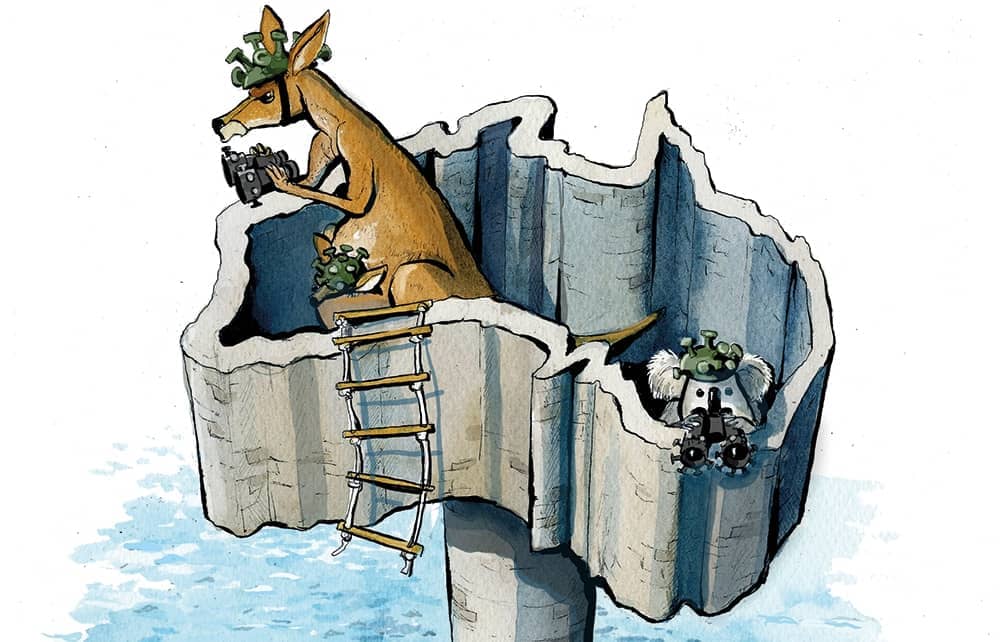The election campaign is under way in Australia, barbs are being exchanged, candidates denigrated and abused, and promises – many of which are just fantastic in the literal sense of the word – are being made. The Prime Minister, Scott Morrison, who is the leader of the Liberal party, is being challenged by the Labor leader, Anthony Albanese. Although Morrison has the edge over Albanese as preferred prime minister, neither is much loved. The leaders are unlikely to be a decisive issue in the election.
What is the deeper mood of the country? That needs to be put into its historical context. Ever since the mid-1970s, Australians have expected political parties to be economically responsible. The public are smart enough to know that it’s one thing to make promises to spend money on all manner of popular causes, but that it must be paid for somehow. This mindset has served Australia extraordinarily well. It has enjoyed more than a quarter of a century of continuous economic growth, thanks to open markets, free trade and relatively light regulatory regimes. These policies have often been referred to in Australia as economic rationalism.
The pandemic led to an end of this rationalism. Suddenly, it became very popular for the government to impose restrictions on freedom of movement and activity, to close the national border with the rest of the world and for state governments to shut down the borders between the states. To compensate for this Stalinist-style closure of society, the government borrowed and printed unprecedented amounts of money and farmed it out to employees, businesses, and anybody else who said they needed help.

For many, this seemed a reasonable response to a pandemic. Covid spread only slowly in Australia and the level of fatalities was relatively low. The public didn’t seem to care how much money was spent as long as they received the compensation they felt they deserved. This has affected the mindset of the country. No one much cares any more about the size of the budget deficit or public debt. What is more, old-fashioned liberal ideas like freedom and taking responsibility for one’s own actions have been jettisoned. The state now knows best.
In the short-term, this is a problem for conservative politics. The governing Liberal/National parties in Australia – like the Conservative party in the UK – have been the champions of individual freedom. But this is out of fashion, which plays into the hands of the opposition Labor party. It believes in collective action and the state taking responsibility for individual wellbeing.
Scott Morrison could make a strong case for his time in office. Australia’s economy is growing faster than almost every other in the G20, its unemployment rate is at a historic low of 4 per cent and the government has reduced its large budget deficit. A strong economy should be a winner for an incumbent government. But Labor wants to spend more money – and the public seem keen on this as an idea. Nobody wants to ask where the money might come from. Inflation hasn’t helped matters.
All that money pumped into the Australian economy – and the world economy, of course – has been the fundamental cause of renewed inflationary pressures. No government is prepared to admit that its excessive spending and the quantitative easing by central banks over the past two years have caused inflation, and the current Australian government is no exception.
The Ukraine war has added to these pressures, although the case could also be made that Morrison’s government was prepared to take on autocratic regimes long before it became fashionable to do so in Europe. While Germany was hungrily importing gas from Russia, Australia was fighting off sanctions imposed by the communist regime in China, negotiating new security arrangements with other democracies in the Indo-Pacific region and making deals to transfer advanced military technology with the UK and the US.
No one much cares any more about the size of the budget deficit or public debt
More recently, China’s leaders have persuaded Australia’s near neighbour the Solomon Islands to conclude a security agreement. This has inevitably led to debate over whether Australia’s government should have stopped the agreement by pouring more aid into the Solomon Islands. But it is hard for a liberal democracy like Australia to offer the kind of ‘aid’ China gives to politicians. Still, Australia’s firm stand against China is strongly supported by the Australian public and it should help the incumbent Liberal/National party government.
A more divisive issue is climate change, which has now destroyed the premierships of four Australian prime ministers. Although Australia has reduced its CO2 emissions by around 20 per cent since 2005 – a much better record than Canada, New Zealand and many EU countries – there is still a sense that Australia could be doing more. It is a narrative which has taken hold and despite the incumbent government committing to net zero by 2050, a commitment matched by the opposition, the richest suburbs of Australia think the government isn’t taking the issue seriously. They are threatening to vote for Labor or left-leaning independents, who may take a few seats which were once considered safe for the Liberal party.
All in all, it will be extremely hard for the incumbent Liberal/National parties government to win, despite its record. Labor is firm favourite to take power. Which just goes to show that no matter how effectively the government governs, it’s hard to get re-elected if the mood of the country is against it.
Alexander Downer joins Cindy Yu on SpectatorTV






Comments